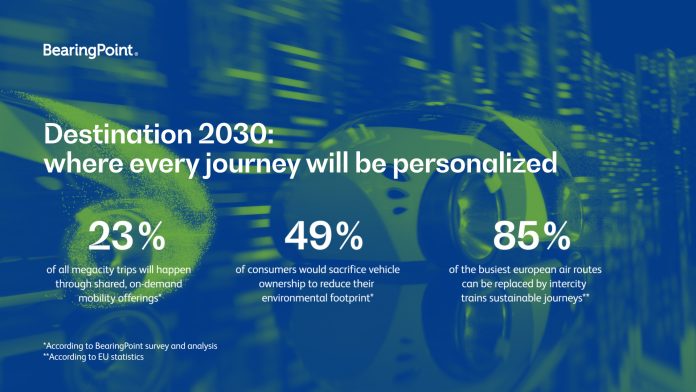Management and technology consultancy BearingPoint’s latest study on mobility sees a personalized travel experience by 2030 that shifts the priorities for all stakeholders in a new mobility ecosystem. The study, Mobility 2030, says all players will battle over customer and value chain data, and service offerings must address national as well as urban and rural demand patterns.
“The automotive industry must respond to the human-centric mobility trend to stay ahead of the competition by maintaining its strategic position as the prime touchpoint to the customer. The industry must provide customers with truly personalized offerings, focus on collecting complex data to derive actionable insights, and orchestrate an ecosystem of partners that embraces new technologies,” said Dr. Stefan Penthin, Global Leader Automotive and Industrial Manufacturing at BearingPoint.
The study is the first in a series of three on mobility and drew from BearingPoint’s internal research, the views of clients across all industry segments and input from the consultancy’s segment and technology leaders. While the automotive industry is the focus, the study examines how all segments will be active in the new mobility ecosystem, from manufacturers and transportation providers to energy suppliers, government organizations, and insurance companies.
By 2030, the study projects that approximately 23% of all megacity trips will be through shared, on-demand mobility offerings (up from just 8% in 2021). By 2030, each player will be part of a demanding new infrastructure and alliance-ecosystem relationships that deliver multimodal journeys with diverse powertrains. Mobility will be consumed as a service, so access to data will be key. On-demand services mean all players will compete to acquire, analyze, and exploit customer data so they can react to changing travel patterns.
“In the journey to 2030, the transportation experience will become individualized, and new infrastructure, services, and relationships will be needed. Providers must be more user-centered and cater to rural and urban demands. Ultimately both utility companies and public transportation organizations will have a new and larger role,” said Marion Schulte, Global Leader Utilities, Postal and Transportation at BearingPoint.
Mobility that maximizes security, personal well-being, and sustainability
Various modes of travel will become integrated, enabling urban and rural intermodal transport hubs. Customers will demand mobility that maximizes security, personal well-being, and sustainability. Risk profiles will diverge for different usage and regions, the study foresees. According to EU statistics, 17 of the 20 busiest air routes in Europe cover distances of less than 434 miles, distances where intercity trains can offer faster, cleaner, and more sustainable journeys.
“As citizens demand greater availability, quality, and flexibility from mobility services, public transportation policy will evolve. Governments should ensure equal access to transport networks for all citizens, and the various modes of travel must be carefully integrated with safety, security, and personal well-being key priorities. Mobility policies should also be designed to maximize citizens productivity, both in terms of working and non-working time,” said Andrew Montgomery, Global Leader Government and Public Sector.
For more details and insights, you can download the study here: https://www.bearingpoint.com/en/insights-events/insights/destination-2030-what-happens-when-every-journey-is-personalized/



















